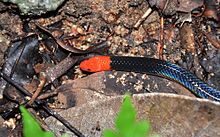| Calamaria schlegeli | |
|---|---|

| |
| Conservation status | |
 Least Concern (IUCN 3.1) | |
| Scientific classification | |
| Domain: | Eukaryota |
| Kingdom: | Animalia |
| Phylum: | Chordata |
| Class: | Reptilia |
| Order: | Squamata |
| Suborder: | Serpentes |
| Family: | Colubridae |
| Genus: | Calamaria |
| Species: | C. schlegeli |
| Binomial name | |
| Calamaria schlegeli A.M.C. Duméril, Bibron & A.H.A. Duméril, 1854 | |

| |
Calamaria schlegeli is a species of snake in the family Colubridae. The species is known commonly as the red-headed reed snake, white-headed reed snake, and pink-headed reed snake. It is native to Southeast Asia, where it occurs in the Malay Peninsula (Malaysia, Singapore), Borneo (Brunei, Indonesia, Malaysia), and in several Indonesian islands, including Sumatra, Java, Bali.
Etymology
The specific name, schlegeli, is in honor of German herpetologist Hermann Schlegel.
Identification

The key identification characters for C. schlegeli are modified maxillary teeth and scale characteristics. The third and fourth upper lip scales touch the eye. The mental scale does not touch the anterior chin shields. The nasal scales are oriented laterally. There is considerable geographic variation. Preocular scales are present in snakes from Singapore and Malaya, but absent in those from Java, and sometimes present on those from Borneo and Sumatra.
This nonvenomous red-headed snake is sometimes confused with the venomous blue Malayan coral snake (Calliophis bivirgatus) and the red-headed krait (Bungarus flaviceps), in an example of Batesian mimicry where a non-venomous animal protects itself by appearing similar to a venomous one.
Biology
C. schlegeli lives in forest undergrowth. It sometimes emerges on paths and in yards and gardens. It burrows for cover and feeds on small prey such as worms and insects.
References
- ^ Iskandar D, Grismer LL [fr] (2012). Calamaria schlegeli. The IUCN Red List of Threatened Species. Downloaded on 18 February 2016.
- ^ Calamaria schlegeli at the Reptarium.cz Reptile Database. Accessed 19 June 2024.
- ^ Calamaria schlegeli. Ecologyasia.
- Beolens, Bo; Watkins, Michael; Grayson, Michael (2011). The Eponym Dictionary of Reptiles. Baltimore: Johns Hopkins University Press. xiii + 296 pp. ISBN 978-1-4214-0135-5. (Calamaria schlegeli, p. 235).
- Inger RF, Marx H (1965). "The systematics and evolution of the Oriental Colubrid snakes of the genus Calamaria". Fieldiana Zoology. 49: 1–304.
- De Rooij, Nelly (1917). The Reptiles of the Indo-Australian Archipelago. Volume 2. Leiden: E.J. Brill. p. 173.
Further reading
- Boulenger GA (1894). Catalogue of the Snakes in the British Museum (Natural History). Volume II., Containing the Conclusion of the Colubridæ Aglyphæ. London: Trustees of the British Museum (Natural History). (Taylor and Francis, printers). xi + 382 pp. + Plates I-XX. ("Calamaria schlegelii ", p. 345).
- Das I [fr] (2006). A Photographic Guide to Snakes and Other Reptiles of Borneo. Sanibel Island, Florida: Ralph Curtis Books. 143 pp. ISBN 0-88359-061-1. (Calamaria schlegeli, p. 27).
- Duméril A-M-C, Bibron G, Duméril A (1854). Erpétologie générale ou histoire naturelle complète des reptiles. Tome septième. Première partie. Comprenant l'histoire des serpents non venimeux. . Paris: Roret. xvi + 780 pp. (Calamaria schlegeli, new species, pp. 81–83). (in French).
| Taxon identifiers | |
|---|---|
| Calamaria schlegeli | |
This article relating to Calamaria is a stub. You can help Misplaced Pages by expanding it. |
- IUCN Red List least concern species
- Calamaria
- Snakes of Southeast Asia
- Reptiles of Brunei
- Reptiles of Indonesia
- Reptiles of Malaysia
- Reptiles of Singapore
- Reptiles of Borneo
- Reptiles described in 1854
- Taxa named by André Marie Constant Duméril
- Taxa named by Gabriel Bibron
- Taxa named by Auguste Duméril
- Calamaria stubs